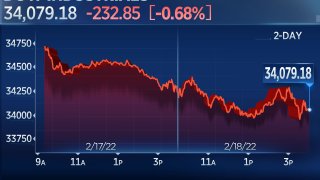
U.S. stock indexes fell Friday and notched a second consecutive losing week as the Russia-Ukraine conflict put investors on edge.
The blue-chip Dow Jones Industrial Average shed 232.85 points, or 0.7%, at 34,079.18. The S&P 500 lost 0.7% to close at 4,348.87. The Nasdaq Composite retreated 1.2% to 13,548.07.
The indexes each lost more than 1% this week.
Get Tri-state area news and weather forecasts to your inbox. Sign up for NBC New York newsletters.
Ongoing tensions between Russia and Ukraine continued to drive market action. The Wall Street Journal reported midday Friday that U.S. officials expect an attack from Russia in a few days. President Joe Biden is expected to move more U.S. troops closer to Ukraine, NBC News reported.
Secretary of State Antony Blinken speaking to the United Nations on Thursday warned that the situation is at a "moment of peril."
"Investors are having a hard time holding onto risk as the likelihood that the standoff between the West and Russia will ultimately lead to some ground conflict," Oanda's Edward Moya said in a note Friday. "Wall Street will remain jittery until we see a major de-escalation."
Money Report
Friday was particularly volatile with trillions of dollars in options and futures on stocks, indexes and ETFs set to expire. Option expiration days, which generally occur on the third Friday of the month, can cause the market to swing in a wide range as these positions are closed out.
WTI crude oil and natural gas dipped Friday, and energy stocks eased. Schlumberger lost 2.2% and Devon Energy was nearly 1% lower.
Intel was the biggest laggard on the Dow, down 5.3%. Bank of America reiterated an underperform rating on the stock.
Roku shares dropped 22.3% after the video-streaming company reported a revenue miss and issued weaker-than-expected guidance.
Investors have also been grappling with the outlook for Federal Reserve policy. St. Louis Fed President James Bullard, who had just called for aggressive action, warned that inflation could get out of control without rate hikes.
New York Fed President John Williams on Friday said he didn't see any compelling reason to take a big step at the beginning, but the central bank could decide later to speed up.
"Whether it's geopolitics, whether it's the labor market, whether it's supply disruptions — no matter what you look at, everything is pointing to inflation being front and center," Rich Bernstein, Richard Bernstein Advisors CEO, told "Closing Bell" on Friday.






